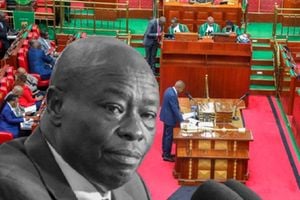
Mahatma Gandhi, the Indian leader, had decided that to wrest independence from the mighty British Empire, he must apply means other than force. ILLUSTRATION| JOHN NYAGAH
The history of human civilisation is also a history of human conflict and wars. But there have been several phases when human civilisation has experienced relative peace.
Pax Romana is a roughly 200-year period between 27 BC and 180 AD which is identified as the golden age of relative peace and order. It is marked by the accession of Augustus as Roman Emperor who deftly steered his vast empire away from conflicts. However, the dictatorial reign of Commodus later followed by the year of five emperors, marked the descent of the empire from the kingdom of gold to one of Iron and dust.
Pax Britannica is the period of peace amongst great powers between the Napoleonic wars and World War 1 in early 1990's.
Long peace is the period of unprecedent peace between major powers that commenced in 1945 after World War II and present.
Of course, there have been in-between civil wars, intra and inter-national conflicts that cause deaths and destruction. However, massive and large-scale wars that involve coalitions of countries have been avoided.
However, things are not looking good presently. The Middle East is aflame. Israel is battling Hizbollah in Lebanon and Hamas in Gaza. Iran fired cruise missiles into Israel. Ukraine war persists and a coalition of countries support it as it battles Russia. South Sudan, Libya, Somalia, DRC Congo wars continue unabated.
A discussion about the war in the Middle East caused intense debate in a WhatsApp group to which I belong. Some supported the Palestinian cause. Others celebrated Israel's sophisticated dome protection against rockets. But the best quip was by one person who said war may appear as a sport to those who are far. But for those facing that reality, it is real trauma and misery.
History shows the centrality of leadership in the progress of humankind affairs. Whether scientific or social progress - leaders with humanistic values have to emerge and pull society forward from the brink of irrationality. Often they do this against the popular views of their generation. Only later generations see the logic of their efforts. Often they suffer a similar fate - assassination or death caused by a present generation that is unable to see beyond narrow present interests.
Take the example of Abraham Lincoln. America to this present day is grappling with issues of racism. Which white politician in 1861 would have the foresight to believe in black man equality? Slavery was part of American society then. But Lincoln’s moral compass imbued in him with a passion to destroy that institution. And he suffered for it - an assassination. But present generations now know he was right.
The story behind the United Nations establishment is interesting. Franklin D. Roosevelt was the US president as World War 2 was brewing in the late 1930s. He had taken a neutral stand as war ensued in Europe. Covertly he knew his country might be dragged into the war but he held back until the Japanese attacked his country in the early 1940's. But he had a vision. He envisioned that perpetual wars could only be reduced if an assembly of all nations was formed.
In November 1943, he met USSR leader Joseph Stalin in Tehran, Iran, and proposed US, China, the UK and the Soviet Union would act as world four policemen. He organised the San Francisco conference of 1945 that formally established the United Nations. He died before it met but an initially reluctant USSR leader Stalin was so moved by FDR passion that he attended and endorsed the United Nations formation. It might have its downside but the UN has contributed to a great extent relative world peace in the period after 1945.
But post 1945 brought into the fore "intra-national" wars and conflicts. This period ushered great ethical leaders who stood for peace like Mahatma Gandhi. His non-violent tackling of Great Britain's colonialism in India was epic. But his fight against tribal discrimination made Hindu nationalists dislike him and ultimately assassinate him.
Nelson Mandela was another great peace advocate in violent South Africa under the Apartheid system.
Rev Martin Luther King's great peace work in the US during the era of civil rights activism in the 1960s remains historical. But he was felled by an assassin's bullet for his efforts.
And therefore, where are such moral leaders who can nudge Israel and Palestinians into peace? Why can't the present world produce another FDR or Luther to cause Ukraine and Russia into peace talks? Or Martin Luther in Sudan or Somalia?
Eliminating wars is our moral duty as a generation. That is the best gift we can give to our children. But we are living in a world where defence spending is on the rise. More sophisticated systems of human destruction are being made. Artificial intelligence and other modern knowledge is being developed to create better instruments of war as opposed to applying that knowledge to provide answers to human problems like curing cancer.
Leaders who believe in universal norms of human rights and equality need to emerge and forge us forward towards world peace. Often these leaders emerge within powerful nations. The United States, being the superpower, has the opportunity to create conditions for the emergence of such a leader. Particularly it bears the greatest moral burden to bring Middle East peace.
It has to be the adult in the room.
Dr Irungu Kang'ata is the governor of Murang'a County. Email [email protected]








